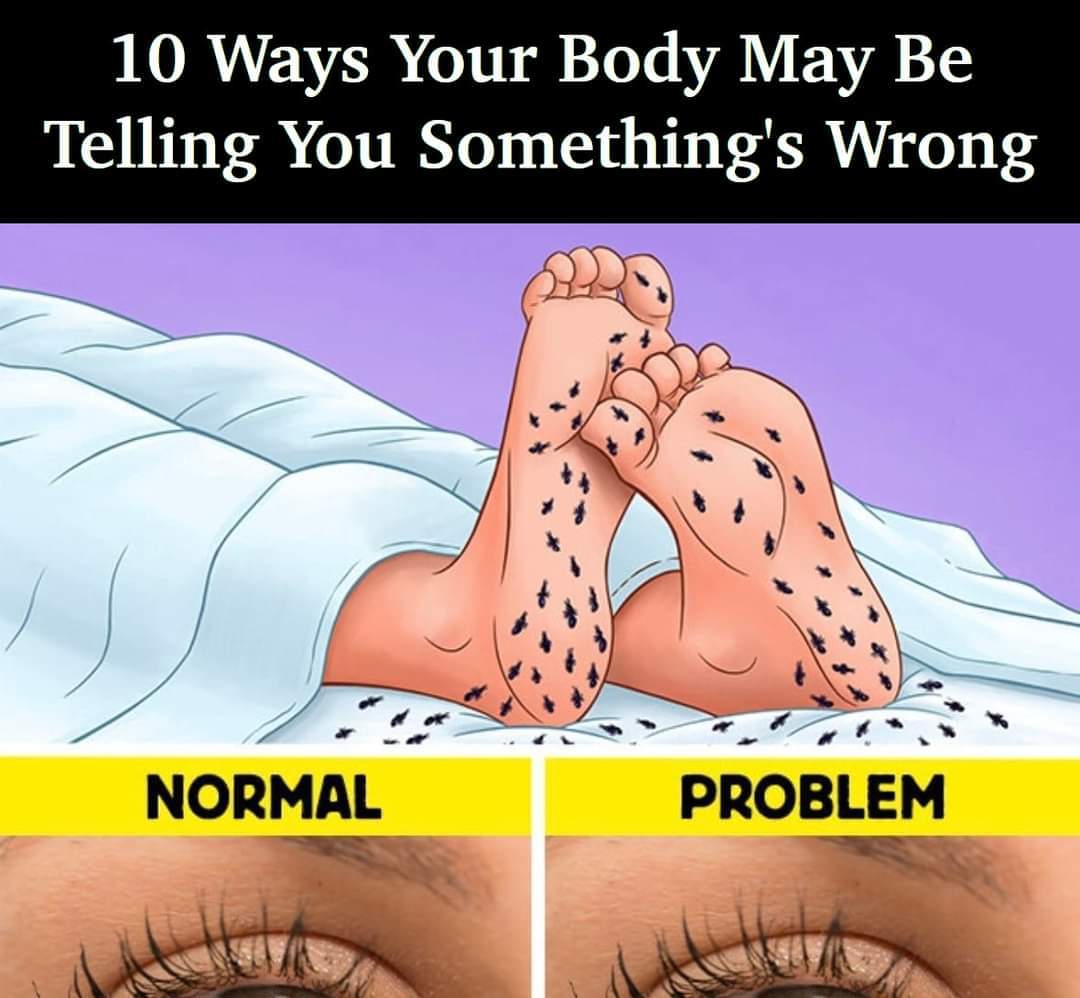Your body has an incredible way of communicating with you, often sending subtle signals when something isn’t quite right. While some symptoms are easy to recognize, like a fever indicating an infection or a sore throat signaling a cold, other signs of poor health are far more discreet. These quiet cues might seem insignificant at first, but ignoring them could mean missing the early warning signs of a more serious condition. Paying attention to these signals allows you to address potential health concerns before they become larger problems. From skin changes to unusual cravings, here are ten subtle ways your body might be trying to tell you something important.

One of the first signs to watch out for is an unusual crawling or achy sensation in your legs, especially at night or when sitting still. This could indicate Restless Leg Syndrome (RLS), a condition that creates an uncontrollable urge to move your legs. Often described as a creeping, pulling, or throbbing sensation, RLS tends to worsen in the evening and can severely disrupt sleep. While the exact cause isn’t always clear, factors such as iron deficiency, medication side effects, or nerve damage are common contributors. Managing RLS may involve medications that regulate dopamine levels, magnesium supplements, or lifestyle changes such as reducing caffeine and establishing a consistent sleep routine. If you suspect RLS, consulting a doctor is the best step.
Another signal is thickening skin. While changes in skin texture are often dismissed as cosmetic issues, they can indicate internal health problems. Conditions such as Psoriasis, Hypothyroidism, or Pityriasis Rubra Pilaris (PRP) can cause skin to become thick, red, and itchy. These disorders are often linked to immune system issues or hormonal imbalances. If you notice persistent skin changes, it’s essential to consult your doctor. Blood tests and a proper skin evaluation can identify the root cause, leading to an appropriate treatment plan.
Subtle changes in your handwriting, sense of smell, or even recurring vivid dreams might seem unrelated, but they can be early indicators of Parkinson’s Disease. This neurodegenerative condition often begins with minor symptoms like small, cramped handwriting, difficulty speaking clearly, or a reduced sense of smell. While these signs may seem harmless, they can precede more noticeable symptoms like tremors or stiffness. Although Parkinson’s has no cure, early detection allows for better management through medications and physical therapy. If you notice these changes, speak to your healthcare provider as soon as possible.
Sudden anger and aggression can also be a red flag. While everyone experiences anger occasionally, frequent outbursts over minor issues may indicate underlying Depression. Mental health professionals have long recognized a link between unmanaged anger and mood disorders. Anger is often overlooked as a symptom of depression, yet it can significantly impact relationships and overall well-being. If you or someone close to you is struggling with anger, seeking help from a therapist or counselor can provide effective strategies for managing these emotions.
Sleeping excessively might seem harmless, but it can be a sign of Hypersomnia, a condition characterized by persistent daytime sleepiness or prolonged nighttime sleep. Unlike regular tiredness, hypersomnia doesn’t improve with naps or extended rest. It can be linked to conditions like Multiple Sclerosis, Depression, or Epilepsy. Treatment often involves stimulant medications, improved sleep hygiene, and lifestyle adjustments like avoiding caffeine late in the day or maintaining a consistent sleep schedule.
Changes in your eye color, specifically a gray ring around the cornea, could indicate Arcus Senilis. While often harmless in older adults, it can signal high cholesterol in younger individuals, increasing the risk of heart disease. If you notice this change, a blood test can confirm cholesterol levels, and treatment may involve medication, dietary changes, and increased physical activity.
An intense craving for salt might seem trivial, but it can point to conditions such as Addison’s Disease, Bartter Syndrome, or Cystic Fibrosis. These disorders often involve hormone imbalances or kidney dysfunction. If your salt cravings become uncontrollable, it’s essential to consult your doctor, as these conditions are usually accompanied by other symptoms like fatigue, low blood pressure, or dehydration.
Forgetfulness, persistent fatigue, and a decreased interest in intimacy could signal Hypothyroidism. This condition occurs when the thyroid gland doesn’t produce enough hormones, leading to symptoms such as weight gain, sensitivity to cold, and dry skin. A blood test can diagnose hypothyroidism, and hormone replacement therapy is a common and effective treatment. If you notice these symptoms, talk to your doctor for proper evaluation.
Excessive thirst, known as Polydipsia, can also indicate underlying health problems such as Diabetes Mellitus or Diabetes Insipidus. Along with persistent dry mouth and frequent urination, extreme thirst often signals imbalances in blood sugar or hormone levels. If you’re experiencing these symptoms, consult your doctor promptly. Early detection is key in managing these conditions effectively.
Lastly, an unusual craving for chewing ice, known as Pagophagia, might suggest an Iron Deficiency or Anemia. While it seems harmless, this craving often signals low iron levels in the body. A simple blood test can confirm the deficiency, and treatment typically involves iron supplements or dietary adjustments.
Your body’s subtle signals are often its way of telling you that something isn’t quite right. While these signs may not always indicate a severe health problem, they shouldn’t be ignored. Recognizing and addressing these warnings early can prevent more serious complications down the road. Whether it’s a persistent craving, a change in your sleep pattern, or an odd sensation in your legs, don’t dismiss these signals. Listen to your body, trust your instincts, and seek medical advice when something feels off. Taking these proactive steps can make all the difference in maintaining long-term health and well-being.





